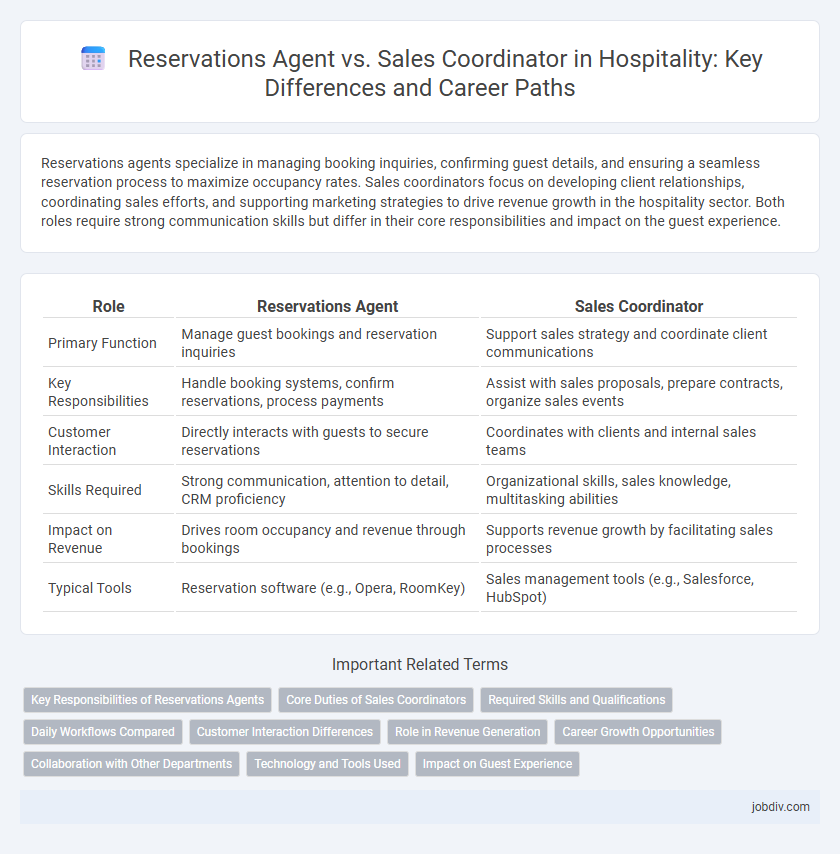Reservations agents specialize in managing booking inquiries, confirming guest details, and ensuring a seamless reservation process to maximize occupancy rates. Sales coordinators focus on developing client relationships, coordinating sales efforts, and supporting marketing strategies to drive revenue growth in the hospitality sector. Both roles require strong communication skills but differ in their core responsibilities and impact on the guest experience.
Table of Comparison
| Role | Reservations Agent | Sales Coordinator |
|---|---|---|
| Primary Function | Manage guest bookings and reservation inquiries | Support sales strategy and coordinate client communications |
| Key Responsibilities | Handle booking systems, confirm reservations, process payments | Assist with sales proposals, prepare contracts, organize sales events |
| Customer Interaction | Directly interacts with guests to secure reservations | Coordinates with clients and internal sales teams |
| Skills Required | Strong communication, attention to detail, CRM proficiency | Organizational skills, sales knowledge, multitasking abilities |
| Impact on Revenue | Drives room occupancy and revenue through bookings | Supports revenue growth by facilitating sales processes |
| Typical Tools | Reservation software (e.g., Opera, RoomKey) | Sales management tools (e.g., Salesforce, HubSpot) |
Key Responsibilities of Reservations Agents
Reservations Agents in hospitality are responsible for managing guest bookings, handling inquiries, and ensuring accurate reservation records to optimize occupancy rates. They coordinate room availability and pricing while providing exceptional customer service to enhance guest experiences. Unlike Sales Coordinators who focus on client acquisition and event planning, Reservations Agents concentrate on the seamless processing and confirmation of reservations.
Core Duties of Sales Coordinators
Sales Coordinators in hospitality manage event planning, coordinate client communications, and ensure seamless execution of group bookings, driving business growth. Their core duties include preparing contracts, tracking event logistics, collaborating with multiple departments, and maintaining client relationships to maximize revenue. Unlike Reservations Agents who handle individual booking transactions, Sales Coordinators focus on strategic sales support and large-scale event coordination.
Required Skills and Qualifications
Reservations Agents require strong communication skills, proficiency in reservation software, and the ability to manage booking details accurately under pressure. Sales Coordinators need expertise in sales strategies, CRM tools, and client relationship management to support revenue growth and coordinate marketing efforts. Both roles demand excellent organizational skills, attention to detail, and multitasking capabilities within the hospitality industry.
Daily Workflows Compared
Reservations agents handle guest bookings, manage availability systems, and confirm reservations to ensure smooth guest check-ins. Sales coordinators develop and implement sales strategies, coordinate with marketing teams, and track client accounts to drive revenue growth. The workflows differ as reservations agents focus on operational guest management, while sales coordinators emphasize client acquisition and relationship building.
Customer Interaction Differences
Reservations Agents primarily handle direct customer interactions by managing booking inquiries, confirming reservations, and addressing immediate guest needs to ensure a seamless booking experience. Sales Coordinators engage with clients more strategically, focusing on building relationships, coordinating event details, and facilitating long-term partnerships rather than day-to-day guest communications. The key distinction lies in Reservations Agents' operational role in real-time customer service versus Sales Coordinators' focus on client relationship management and sales support.
Role in Revenue Generation
Reservations Agents directly impact revenue by managing bookings and optimizing room occupancy rates through effective communication and customer service. Sales Coordinators support revenue generation by coordinating marketing efforts, facilitating client relationships, and assisting in sales campaigns to drive group bookings and event sales. Both roles collaborate to maximize revenue streams, with Reservations Agents focusing on individual reservations and Sales Coordinators targeting bulk and corporate sales.
Career Growth Opportunities
Reservations agents develop strong customer service and booking management skills, creating a foundation for advancement into sales, front office management, or revenue optimization roles. Sales coordinators gain expertise in client relations, contract negotiations, and marketing strategies, positioning them for higher-level sales management or business development careers within hospitality. Both roles offer distinct career growth opportunities tailored to different facets of hotel operations and revenue generation.
Collaboration with Other Departments
Reservations Agents coordinate closely with front desk and housekeeping teams to ensure accurate booking details and room availability, enhancing guest satisfaction. Sales Coordinators work alongside marketing, events, and catering departments to align promotional efforts with booking strategies and client requirements. Both roles facilitate seamless communication between operational and sales units, driving efficient workflow and optimized revenue management.
Technology and Tools Used
Reservations agents primarily utilize property management systems (PMS) such as Opera or Cloudbeds to manage bookings efficiently, while sales coordinators rely on customer relationship management (CRM) platforms like Salesforce or HubSpot to track leads and manage client interactions. Both roles leverage communication tools such as email platforms and collaboration software like Slack or Microsoft Teams to ensure seamless coordination. Advanced analytics and reporting tools are increasingly adopted by sales coordinators to optimize sales strategies, whereas reservations agents focus more on integration with online travel agencies (OTAs) and booking engines.
Impact on Guest Experience
Reservations Agents directly influence guest experience by managing booking accuracy, availability, and personalized preferences, ensuring seamless check-in and satisfaction. Sales Coordinators enhance guest experience indirectly through strategic event planning, coordination, and tailored package offerings that attract and retain clientele. Both roles collaborate to optimize overall guest satisfaction but target distinct touchpoints within the hospitality service chain.
Reservations Agent vs Sales Coordinator Infographic

 jobdiv.com
jobdiv.com